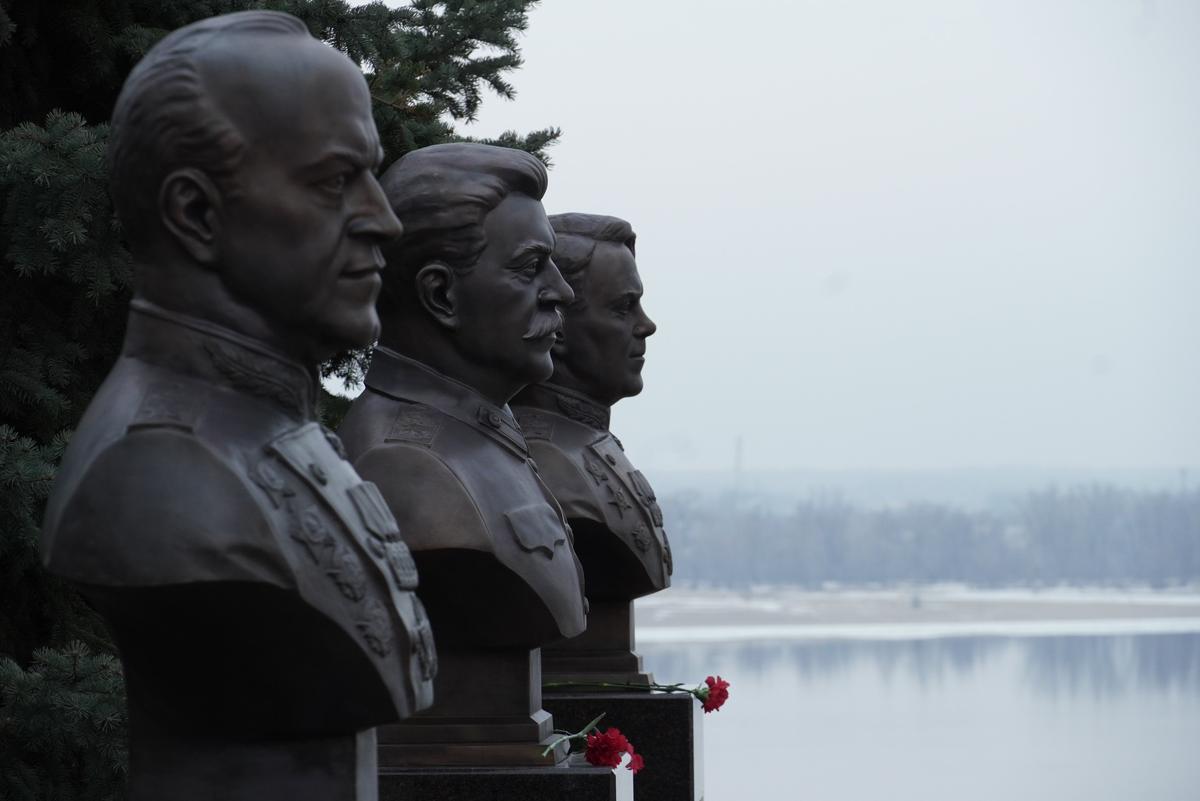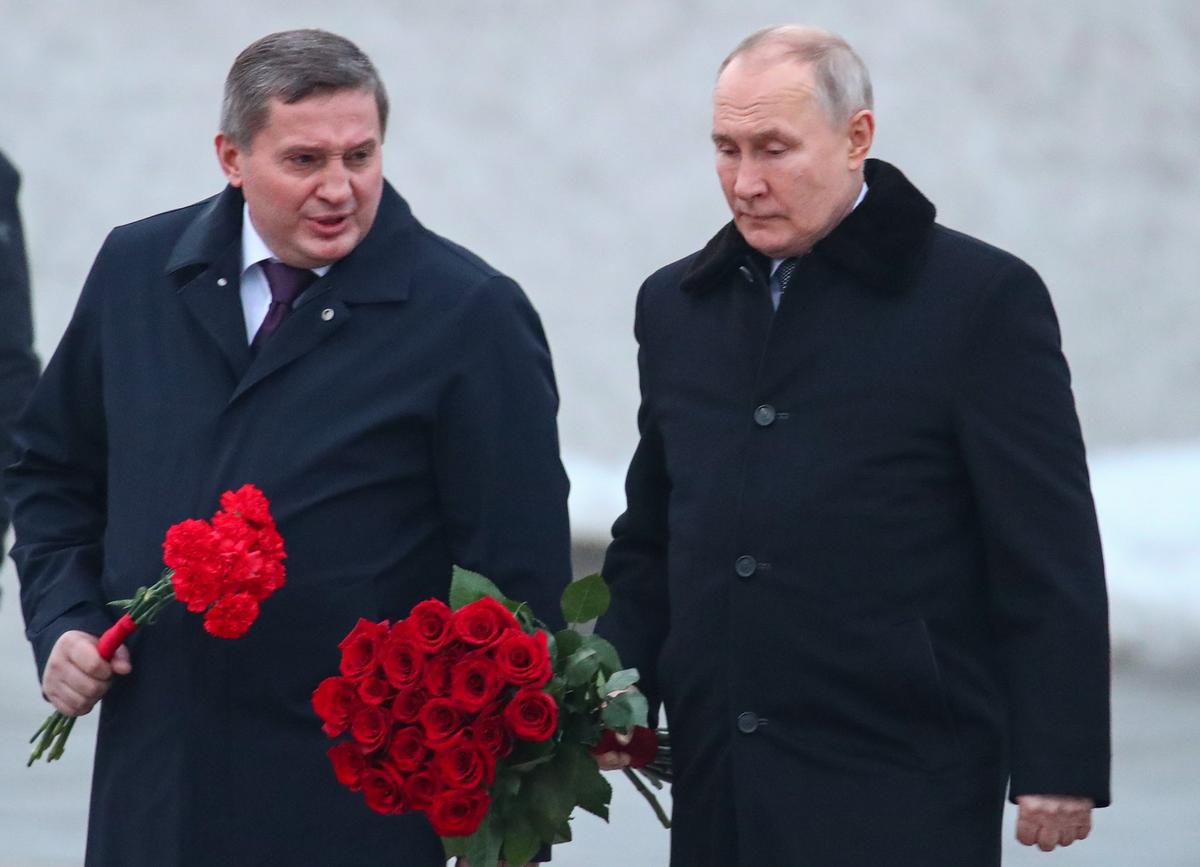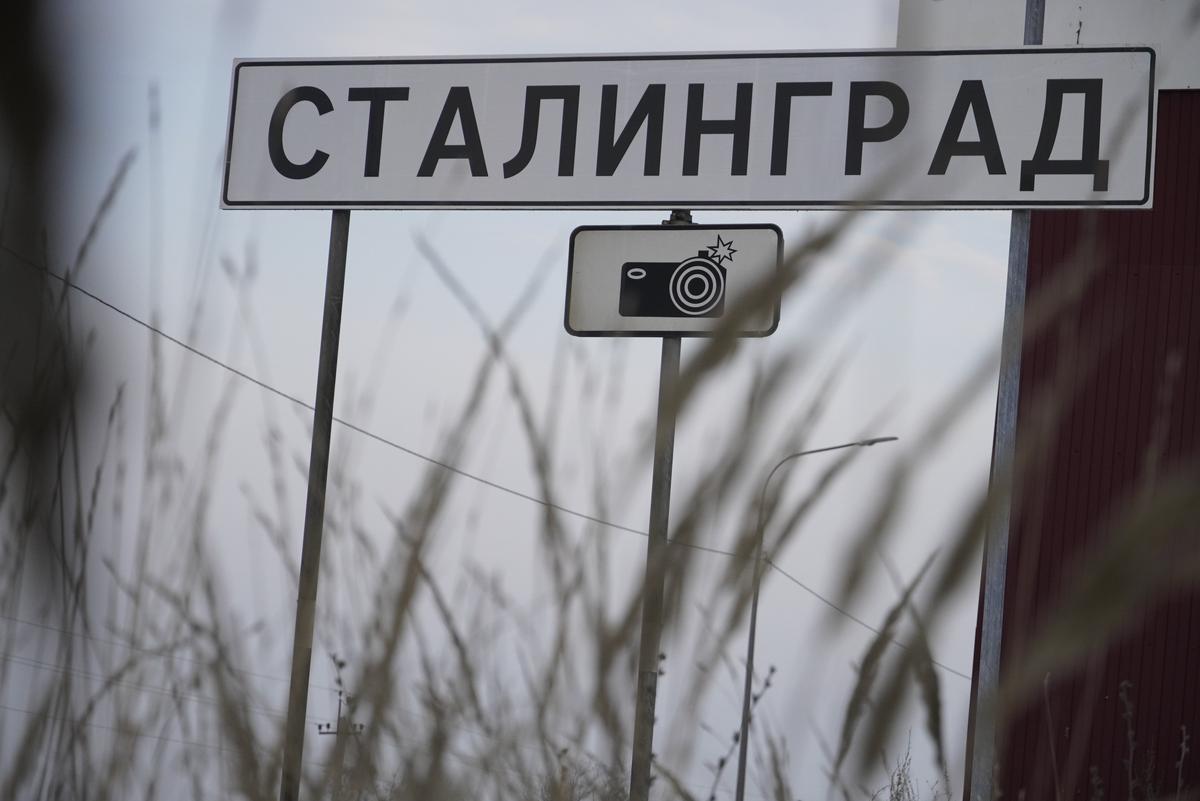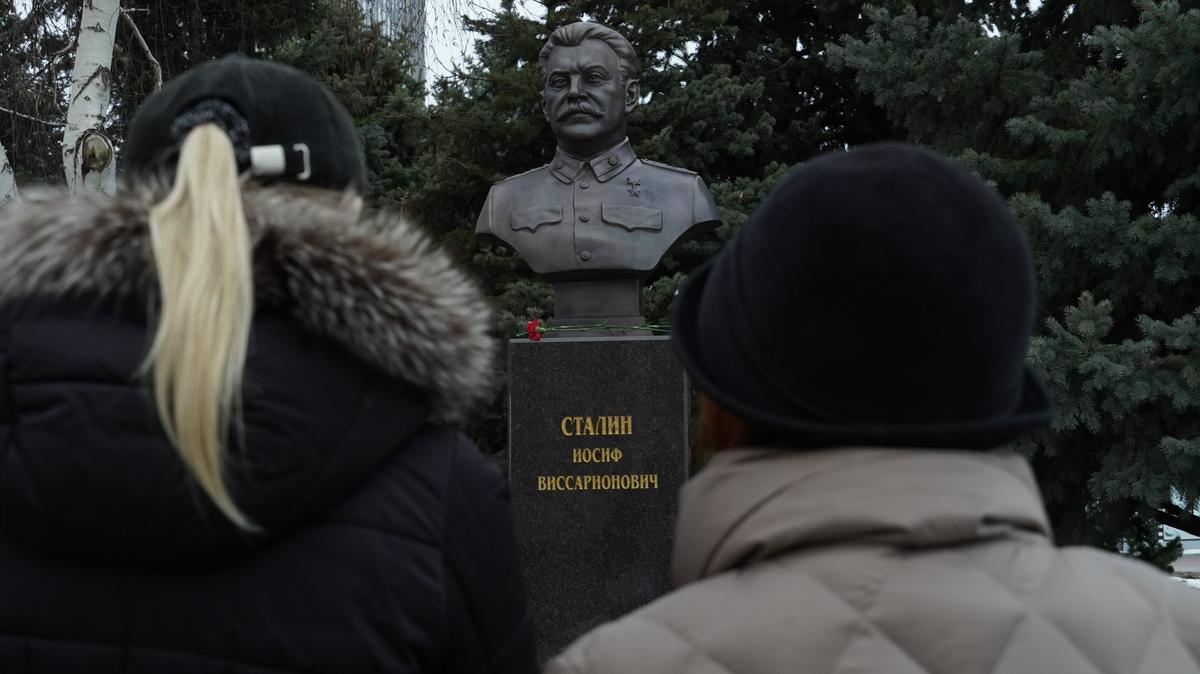On 1 February, a monument to Joseph Stalin was pompously unveiled in Volgograd, just 120 metres away from a memorial commemorating victims of political repressions. The next day, when Vladimir Putin arrived in the city to celebrate the 80th anniversary of the World War II Stalingrad Battle against Nazi Germany, Volgograd was renamed Stalingrad for one day, for the second time in the past six months to commemorate cornerstone dates of the Second World War.
Shortly before that, posters emerged all over the city as part of a large-scale public campaign to bring back the old Soviet name, while local authorities created an official council to gauge opinions of Volgograd residents about the potential name switch.
Novaya Gazeta Europe investigates who is behind the initiative to revive the old city name and what are the chances of such a referendum taking place.
‘Our city is not worthy of his name’
The Stalingrad Battle victory celebrations were spread over two days, 1 and 2 February. Public employees were given days off for the duration of the festivities at the initiative of the Volgograd Veteran Council.
Sculptures of two Soviet marshals, Georgy Zhukov and Alexander Vasilevsky, were revealed to the public along with the Stalin bust on the first day near the Stalingrad Battle Museum. Local lawmakers, Russia’s Young Army Cadets National Movement members, veterans, and hundreds of city residents attended the celebrations.
A marble monument to Zhukov used to occupy the place where the three busts have now been erected. The old monument was placed indoors, and one war general was replaced with three.
Sergey Shcherbakov, the sculptor of the busts, told local media that the Stalin bust had to be made in a hurry: “Everything was quick, I needed to fulfil the order in a very tight timeframe. It was a very serious job, no room for hesitation. Everything was very precise and direct.”
According to Volgograd’s media outlet V1.ru, the sculptures cost three million rubles (€38,800) to make. This sum was provided by a local foundation that sponsors the Ukraine war. According to V1 sources familiar with the internal operations of the foundation, the organisation was established to avoid disclosing certain expenditures through the public procurement system. Shcherbakov confirmed this information to the media outlet but refused to specify the price.
Alexander Bloshkin, head of the regional veteran council and speaker of the local parliament, was the first to speak at the event.
According to him, reinstating the Soviet leader’s images as well as the old city name will immortalise the WWII victory.
The initiative to change the city’s name to Stalingrad was actively discussed at the unveiling ceremony. Bloshkin specifically alleged that Volgograd residents, veterans in particular, are now asking local lawmakers and officials to rename the city, and not the other way around.
Simultaneously, the city held a rally in support of the name change: a few locals marched in the city centre with a St. George ribbon (official symbol of Victory Day in Russia — translator’s note) coloured banner, chanting “For Stalingrad!”. One of the marchers said that the name Stalingrad “truly gives him wings” to explain his exaltation.
Tatyana Pedan, regional coordinator for the Left Front socialist movement, also mentioned the potential name change. Pedan underlined that she appreciates the Stalin bust but opposes the return of Stalingrad. “Of course, I wanted the city to be named after Stalin, but I believe that the city is not worthy of his name in its current state.”

Busts of Zhukov, Stalin and Vasilevsky in Volgograd at the unveiling ceremony. Photo: Vladimir Aleksandrov / Anadolu Agency / Getty Images
Vladimir Titov, member of the opposition Yabloko political party’s Volgograd office, condemned the bust opening ceremony and noted that the city did not voice its opposition to the move because Russia’s civil society is now “completely trampled”. “The authorities found a convenient time when few can say anything,” Titov explained.
Member of Yabloko’s federal office Alexander Efimov also opposed the Stalin monument and started a petition against renaming Volgograd to Stalingrad which has already been signed by more than 2,000 people. He believes that there was no wide-spread campaign against the monument because “people do not understand the danger”.
“There is a group of people that supports the government and Stalin’s practices. They are now trying to consolidate, militarise, and use it as a resource in what’s happening now,” Efimov notes.
Putin travelled to Volgograd on the second day of the Stalingrad Battle victory festivities.
The city cordoned off streets and jammed the Internet connection to prepare for his visit, while local authorities replaced street signs to say Stalingrad for one day.
Preparations for Putin’s visit began long before it was officially announced. V1.ru notes that Volgograd region governor Andrey Bocharov was not seen in public after 24 January. According to the outlet, he was sent into quarantine ahead of meeting the Russian leader.
On 2 February, Putin delivered a speech at the Central Concert Hall where he particularly said that Russia is threatened by German tanks marked with crosses again and drew parallels between the Ukraine war and the Soviet Union’s fight against Nazi Germany. At the same time, Putin forgot to mention that the Bundeswehr military equipment has medieval Templar crosses drawn on it and not the Balkenkreuz from the Wehrmacht times.
“We do not send our tanks to their borders, but we have a response and we will not stop at using armoured vehicles,” he added.

Vladimir Putin and Andrey Bocharov at the Stalingrad Battle victory celebrations, 2 February 2023. Photo: EPA-EFE / DMITRY LOBAKIN / SPUTNIK / KREMLIN POOL MANDATORY CREDIT
‘A bid for a super breakthrough’
Volgograd’s renaming into Stalingrad was already discussed back in the early 2000s: Communist Party member Alevtina Aparina backed the return of the old name in 2002. In response, Yabloko member Vladimir Titov wrote an article suggesting that local Lenin Avenue be renamed into Stalingrad Avenue because this is where the fighting for the city took place. However, his initiative was not supported. “I am saying that this is a political issue, you see? One half of the population does not like Stalin at all, the other half likes him too much. Let’s not split society,” he explains.
In 2013, the 70th anniversary of the Stalingrad Battle victory, Aparina once again tried to promote her idea by suggesting to split the notions of the city of Volgograd and the Hero City of Stalingrad (Hero City is a Soviet honorary title awarded for outstanding heroism during World War II — translator’s note). The Volgograd city council accepted the proposal and ruled that the city would be renamed on special occasions for a single day with no legal consequences. Volgograd now changes its name nine times a year on WWII- and military-related dates.
The same year, head of the Communist Party’s faction in the regional parliament Nikolay Parshin said that “reinstating the city’s name as Stalingrad is the right decision from the legal and historical viewpoints”. The party was going to file a lawsuit with Russia’s Supreme Court to declare the 1961 decision to rename the city unlawful. However, the lawsuit never materialised.
The issue was raised once again in 2021 when co-chair of A Just Russia — For Truth political party Zakhar Prilepin said that he had drafted a bill to officially rename the city to Stalingrad.
According to him, the name change represents “a bid for a super breakthrough, for building new socialism, and dominating Eurasia”.
He was going to submit the relevant bill to the Russian parliament’s lower house, but never made it past the highly publicised intentions.
In 2022, lawmakers from the ruling United Russia party suggested changing the regional legislation on renaming territories and cities. The initial version read that public sentiments about name changes are gauged through polls. The lawmakers’ proposal did not contain this item. Instead, to assess the public opinion the regional parliament is meant to send documents within five days from approving the motion to a representative body which has 45 days to decide the best course of action.
The lawmakers were insisting that the proposal was just a formality to match the regional legislation to the federal practice. The initiative, however, caused a lot of conversations in the region as people were suspicious that the bill could usher in the renaming of Volgograd irrespective of its residents’ opinion.
In summer 2022, Governor Bocharov ultimately signed the law but with a significant amendment, saying that any name change is only possible through a referendum or a poll.
In November, another Stalingrad proposal was submitted by the Regional Veteran Council headed by Alexander Bloshkin. In turn, Bocharov reminded the organisation that any official change of name should be done after consulting the population. The governor instructed officials to create a special public council made up of representatives of the veteran community, the authorities, and regional citizen groups to study the public opinion on the matter. The council is meant to provide an answer whether any potential referendum is necessary. It is not, however, known how it will poll Volgograd residents and analyse the results. The council held its first meeting on 5 February but no important decisions were made.

Temporary Stalingrad sign placed outside of Volgograd. Photo: Vladimir Aleksandrov / Anadolu Agency / Getty Images
Alexander Saygin, a political scientist from Volgograd, told Novaya Gazeta Europe that the council has “a decorative task of imitating a public opinion” and representing those supporting the change of name when possible. According to him, the council members are sceptical about any polls and believe that they can tip the scales in favour of Stalingrad.
“To be honest, a referendum would be a brilliant solution in the current situation to put the renaming idea to rest once and for all. Because no one will be able to raise this topic for at least ten years if residents oppose any name change,” Saygin explains.
At the same time as the discussions in the city council were taking place, posters and leaflets depicting Stalin and the Motherland Calls monument urging the city to change its name to Stalingrad appeared all over Volgograd in autumn 2022. It is unclear who paid to have them made. The local authorities did not report any spending of this kind.
Stalin’s images emerged on buildings at that time as well. Works started on recovering the outline of the dictator’s bas-relief on the Volgograd medical university and the local planetarium. The relevant decisions were placed in public contracts for restorations.
Local media outlets believe that the full-scale preparations for the referendum can start in 2023, while the vote itself can be held at the same time as the governor or presidential elections in 2024.
In early January, the Volgograd/Stalingrad issue reached the Russian government. Putin’s spokesman Dmitry Peskov noted that the Kremlin is not engaged in any discussions about the potential name change.
‘Politicians come and go, but the great river of Volga remains’
In autumn 2022, local media outlets took it upon themselves to ask Volgograd residents their opinions on the return of Stalingrad. Local politicians also voiced their views on the issue. For instance, former Prime Minister of Russia Sergey Stepashin and General Secretary of Russia’s Communist Party Gennady Zyuganov backed the initiative.
Former Volgograd Mayor Roman Grebennikov slammed the idea as a “political trick”. “Someone wants people to think about the city’s new and old names instead of real issues,” he said.
Ahead of Putin’s Volgograd visit, Russia’s state polling service published results of its poll at Bocharov’s initiative: 67% of the city residents opposed the idea, while only 26% backed it. Most of the respondents disagreed with the name change due to concerns about high costs and possible “money laundering” (21%). The second-most popular reason is “don’t see any point” (12%).
Igor Belskikh, Professor of Economics with the Volgograd branch of the Plekhanov Russian University of Economics, told Novaya Gazeta Europe that around 700,000 Volgograd residents would be required to change official documents which would cost hundreds of millions or even billions of rubles and overwhelm local state institutions. “Some people just would not want to change documents for ideological reasons, some just don’t have time for that. Those are all potential fines that will fill up local deficit budgets and cause a lot of tensions locally,” Belskikh explains.
He also notes that authorities would need to spend quite a bit on reissuing maps and similar documents. The economist puts the total cost of this operation at several billion rubles (one billion rubles is valued at about €12.9 million).
“The price is too high, while changing the name of Volgograd is completely pointless. Even more so that Stalin’s notorious name is unacceptable for historical, ethical, and many other reasons. Politicians come and go, while the great river of Volga remains forever. Volgograd is the best name for the city,” he notes.
Join us in rebuilding Novaya Gazeta Europe
The Russian government has banned independent media. We were forced to leave our country in order to keep doing our job, telling our readers about what is going on Russia, Ukraine and Europe.
We will continue fighting against warfare and dictatorship. We believe that freedom of speech is the most efficient antidote against tyranny. Support us financially to help us fight for peace and freedom.
By clicking the Support button, you agree to the processing of your personal data.
To cancel a regular donation, please write to [email protected]

